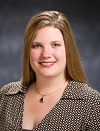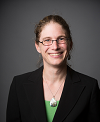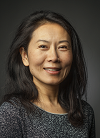Women in Science and Engineering (WISE)
“A ship in port is safe, but that is not what ships are for. Sail out to sea and do new things.”--Grace Hopper
Grace Hopper was a rear-admiral and a mathematician. She was also the developer of the first compiler of a programming language and played a key role in developing COBOL, one of the first high-level languages. The women students and faculty of the College of Engineering at Cornell will not play it safe—they will sail out to sea and they will do great things.
With the end of the NSF ADVANCE award in 2013, the torch has been handed back to the Women in Science and Engineering (WISE) group. Worthy goals remain for us to pursue: continuing to advocate for more women faculty, improving the situation for dual-career hires, reducing student bias against women and under-represented faculty teachers, and encouraging more women to continue to advanced degrees and to pursue faculty careers.
Testimonials from Cornell Engineering Faculty
Susan Daniel,
Professor, Chemical and Biomolecular Engineering
 Today’s female undergraduate STEM majors often have female professors they can look to as role models and mentors. Yet female professors do not always have senior female faculty to play these same roles for them. WISE helps fill this critical role in faculty development. It is a network that supports women faculty and strives to help them be successful. WISE provides a forum for discussing ideas and concerns specific to female faculty, advocates strongly for women with the upper administration, and unites women across the College of Engineering, thus encouraging a cross-pollination of ideas that benefits everyone. As a young assistant professor, I benefitted from the many positive interactions I had with this group and I believe WISE was a critical factor in my success at Cornell. Cultivating competent female faculty leadership will be a key factor in keeping Cornell a top-ranked school of engineering at the forefront of positive societal change.
Today’s female undergraduate STEM majors often have female professors they can look to as role models and mentors. Yet female professors do not always have senior female faculty to play these same roles for them. WISE helps fill this critical role in faculty development. It is a network that supports women faculty and strives to help them be successful. WISE provides a forum for discussing ideas and concerns specific to female faculty, advocates strongly for women with the upper administration, and unites women across the College of Engineering, thus encouraging a cross-pollination of ideas that benefits everyone. As a young assistant professor, I benefitted from the many positive interactions I had with this group and I believe WISE was a critical factor in my success at Cornell. Cultivating competent female faculty leadership will be a key factor in keeping Cornell a top-ranked school of engineering at the forefront of positive societal change.
Lara Estroff,
Director and Professor, Materials Science and Engineering
 After receiving my undergraduate degree in chemistry with a minor in anthropology, I spent a year at the Weizmann Institute of Science in Rehovot, Israel. It was there that I saw many examples of women at all points in their careers who were world-class scientists and were able at the same time to have a rewarding family life. Throughout graduate school and my postdoctoral research, I remembered these role models and worked to achieve a similar balance in my life, a goal I still work hard to maintain.
After receiving my undergraduate degree in chemistry with a minor in anthropology, I spent a year at the Weizmann Institute of Science in Rehovot, Israel. It was there that I saw many examples of women at all points in their careers who were world-class scientists and were able at the same time to have a rewarding family life. Throughout graduate school and my postdoctoral research, I remembered these role models and worked to achieve a similar balance in my life, a goal I still work hard to maintain.
When I began my independent career at Cornell Engineering I was very happy to find the Women in Science and Engineering (WISE) group already firmly established. Being a new faculty member is hard no matter who you are, but there are some issues that impact female faculty disproportionately and WISE gave me a place to talk about these things. It also assigned me a mentor, hosted informal lunches, and offered help with preparing my third-year review and tenure packages. Now that I have been here ten years, I find I am in a middle kind of role with WISE. I still turn to more senior female faculty with questions, but I am also able to offer my experiences and advice to younger women just starting out. The College of Engineering at Cornell has been a leader for the whole university in changing the climate for female faculty, and WISE has had a big part in the college’s success.
Huili (Grace) Xing,
William L. Quakenbush Professor, Electrical and Computer Engineering and of Materials Science and Engineering
 As an undergraduate student majoring in Physics at Peking University in China I was one of just 6 women in my major out of about 90 students. There was one female professor in the department, Chenjia Chen, who taught us atomic physics. All 6 of us loved her so much that we all topped the course. I was lucky enough to have another two very impressive women professors in my graduate programs at Lehigh and UC-Santa Barbara, Helen Chan and Evelyn Hu. All my professors were inspiring and let me see that there is a place for women in the highest levels of academic research.
As an undergraduate student majoring in Physics at Peking University in China I was one of just 6 women in my major out of about 90 students. There was one female professor in the department, Chenjia Chen, who taught us atomic physics. All 6 of us loved her so much that we all topped the course. I was lucky enough to have another two very impressive women professors in my graduate programs at Lehigh and UC-Santa Barbara, Helen Chan and Evelyn Hu. All my professors were inspiring and let me see that there is a place for women in the highest levels of academic research.
Women in science and technology are just like men in science and technology in that we are a group defined by our outsized curiosity. It is important that undergrads and graduate students who come here with a wide array of interests have many examples of female faculty who are already active and successful in these areas. Just as importantly, the first years as a professor are hard and some of the things you do, you must do alone. It can be so very helpful to be able to turn to people who have already made it through those first years and are able to give advice, guidance, and support. That is why the Women in Science and Engineering (WISE) faculty group at Cornell is so valuable.
See a complete listing of all Cornell WISE members.
History of Women in Cornell Engineering
Brief History of WISE by Paulette Clancy,
The Samuel & Diane Bodman Chair of Chemical & Biomolecular Engineering.
Pre-history: If memory serves, the women faculty started to organize themselves in about 1997 into a group that eventually became known as WISE, and I was fortunate to be its first Chair. A decade prior to the formation of this group, there had been an oddly named “Status of Women” committee, which Prof. Christine Shoemaker (CEE) led and I eventually took over briefly as an untenured faculty member. Christine was the only woman faculty member I remember meeting in those early days; she had taken on the mantle of the champion for women faculty, and I was lucky to be her “apprentice.” She remained active in WISE until she left Cornell in 2015 for a new opportunity in Singapore.
Activism for women engineers: WISE was an activist group from its inception. Some of the early issues that we faced are still important today. For instance, we wrote a maternity leave policy to replace the variety of outcomes that resulted from individual negotiations with department heads with a consistently applied policy. The original 1998 draft of the policy was 2 or 3 sentences long, but it was rewritten to be a far more inclusive gender-neutral family leave policy that still exists today and has served us well. At the turn of the century, we were worried about the lack of women students in computer science, and computational sciences in general. This situation remains unresolved.
Some of the other issues are, thankfully, no longer a concern. For instance, the old Women’s Programs office in the College of Engineering was reconceived from its focus on remedial help for women students, based on advocacy by WISE. That office evolved into an award-winning Diversity Programs in Engineering group that pro-actively helps support the changing face of under-represented groups. Sustained efforts by a creative Admissions staff, from then Director Betsy East to the present day, mean that we now boast an undergraduate program that makes as many offers to women prospective engineering freshmen as to men. Parity for women undergraduates seems to be within our grasp, and our record far outstrips the national average. Parity is nowhere near the case for graduate women and more needs to be done to attract women to obtain PhD degrees in Engineering.
A bombshell from MIT: In 1999, an MIT study on “the status of women in science” caused a massive ripple throughout the country when MIT admitted to discriminating against female faculty in “subtle but pervasive” ways. Universities scrambled to assess their own degree of bias. Sadly, unequal pay for men and women nationally, not just in universities, is still an issue (see the recent White House statements and the rise of the hashtag #equalpaynow). In the wake of the MIT report, WISE played an important role in helping to increase support for women faculty hires through a subcommittee that awarded WISE “term chairs.” From the late 1990s to 2009, this WISE sub-committee ‘s $500,000 budget from the Provost’s office helped us to support offers to 31 women faculty candidates, resulting in 11 new women faculty on campus.
Recruitment and Advocacy: Beyond its role in faculty hiring, WISE acted as a strong voice for women faculty by ensuring the equity of their initial salary and the size of their start-up funds. It also played a key role in developing a mentoring plan to support the candidate, and sharing best practices for the professional development of young faculty with chairs and directors. It advocated for and offered options to mitigate a long-term solution for two-career families. The success of this WISE sub-committee spawned the development of a College-wide Strategic Oversight Committee (based on Purdue’s SOC) that continues to encourage and monitor effective practices for hiring a diverse faculty in terms of gender and ethnicity.
The coming of ADVANCE: A defining moment for women’s programs came in 2006, with a successful NSF ADVANCE award led by Professors Sheila Hemami (ECE), Marjolein van der Meulen (then MAE, now Director of BME) and Shelley Correll (Sociology) and sanctioned by the Provost’s office. ADVANCE’s goals were to “increase the recruitment, retention, and promotion into leadership positions of women in engineering and the sciences, and to institutionalize best practices, policies and programs across colleges as they pertain to women faculty.” Cornell’s ADVANCE program profoundly affected the pursuit of these goals, and created a community of women scientists and engineers from across campus. The program fearlessly pursued the goal of equity and a welcoming climate for those of us already here at Cornell. Importantly, it also set quantitative milestones: 20% women faculty in each department of science and engineering at Cornell and one-third women by the 2015 sesquicentennial. As they so rightly said: “This level will move the representation of women from token status to a critical mass in each department, the environment that most determines faculty daily life.” STEM hiring in women at Cornell did indeed reach 33.3% overall in AY 2015-16, but much remains to be done to reach even the 20% target for women faculty in each department, particularly in engineering.
Fellow Nomination Suggestions
Contact Us
Present WISE co-chairs (2023- )
Sarah Hormozi, CBE, Associate Professor
Grace Barcheck, EAS, Assistant Professor
Sriramya Nair, CEE, Assistant Professor
Past WISE co-chairs (2020 - 2022)
Mingming Wu, BEE, Professor
Zhiting Tian, MAE, Associate Professor
Julia Dshemuchadse, MSE, Assistant Professor
Past WISE co-chairs (2015-2020)
Huili Grace Xing, ECE & MSE, William L. Quackenbush Professor of ECE
Hadas Kress-Gazit, MAE, Associate Professor

